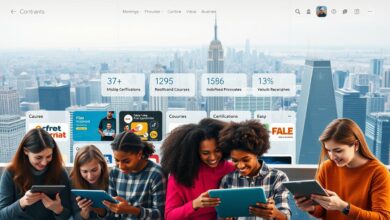Self-Education Roadmap: Learn Anything Online and Prove Your Skills to Employers
In today’s fast-paced digital world, self-education is more important than ever. People looking to grow personally can use online courses to learn what they need. Learning online is flexible, easy to access, and affordable, making it a great choice for those who want to learn on their own.
Anúncios
This article is your guide to taking control of your learning. It shows you how to navigate the world of self-education. You’ll learn how to start your own learning journey and prove your skills to employers.
Introduction to Self-Education
Self-education is a new way to learn that focuses on personal effort and growth. With the internet full of information, more people are choosing self-education. It lets them learn what they want and need for their careers, helping them grow personally and professionally.
What is Self-Education?
Self-education means learning on your own, not just in school. It includes taking online courses, reading books, and watching videos. This way, people can learn many things and keep learning their whole lives.
Why Choose Self-Education?
There are many reasons to choose self-education:
- It lets you learn what you’re really interested in.
- You can learn at your own speed, without rush.
- You can dive into special topics that schools might not cover.
This method not only adds to your knowledge but also boosts your motivation and freedom. By controlling their learning, people can improve themselves in many ways.
Setting Your Learning Goals
Setting clear learning goals is key for self-learning and personal growth. Goals give direction and keep you motivated. This part will show how to find your interests and set measurable goals for a structured learning path.
Defining Your Interests
Knowing your interests is the first step in setting goals. You should look at your passions and strengths. Then, match them with your career dreams. This makes learning fun and useful for your future.
Tools like career tests or self-reflection can help find what drives you. By focusing on these interests, you can enjoy learning and grow for the future.
Establishing Measurable Objectives
Having measurable goals is vital for tracking your progress. Using the SMART framework can make setting goals easier. SMART goals are:
| Criterion | Description |
|---|---|
| Specific | Clearly define what you want to achieve. |
| Measurable | Quantify your objectives to assess progress. |
| Achievable | Set realistic goals considering available resources. |
| Relevant | Ensure that the goals align with personal interests and career aspirations. |
| Time-bound | Establish a timeline for completing objectives. |
With this framework, you can set goals that help you make steady progress. Being clear and structured keeps you motivated. These goals will be your markers on your educational journey.
Finding Quality Online Resources
Exploring online education can feel overwhelming. It’s key to find good online resources for learning on your own. Many trusted sites offer a wide range of educational materials. They meet different learning needs and styles.
Reputable Platforms to Explore
Coursera, edX, and Udemy are well-known sites. Coursera works with universities and big companies to offer online courses in many subjects. EdX focuses on higher education, teaming up with top schools. Udemy has a huge selection of courses, many made by experts in their fields.
These sites not only offer courses but also create a community for learners.
Free vs. Paid Options
When looking at online resources, it’s important to think about free versus paid options. Free resources might not have all the features, but they’re great for those watching their budget. They often have basic courses to get you started.
Paid options usually have more, like personal support and certificates when you finish. Knowing the difference helps you choose the best learning path for you.
Choosing Your Learning Methodology
Understanding different learning methods is key to self-education. Knowing if you’re a visual, auditory, or kinesthetic learner helps you study better. Each style has its own strengths, making learning more enjoyable.
Visual, Auditory, or Kinesthetic Learning
Visual learners do well with charts, diagrams, and videos. These images help them remember complex ideas. On the other hand, auditory learners get information better through sound, like lectures and podcasts.
Kinesthetic learners learn best by doing. They enjoy activities that let them use their hands. This hands-on approach helps them understand better.
Blended Learning Approaches
Blended learning mixes online classes with traditional teaching. It’s flexible and keeps the benefits of face-to-face learning. This method combines different learning styles to keep students engaged and retain knowledge better.
By including visual, auditory, and kinesthetic elements in lessons, everyone can learn more. This makes learning more effective and enjoyable for all.
Building a Structured Learning Plan
A structured learning plan is like a roadmap for personal growth. It guides you through your learning journey. An effective plan starts with a study schedule that fits into your daily life. This schedule helps you grow your skills over time.
Being flexible with your plan is key. It lets you handle other life tasks while keeping your learning on track.
Creating a Study Schedule
Creating a study schedule is vital for staying focused. Break your study time into smaller, easier-to-manage chunks. This method helps you track your progress and makes learning a part of your daily routine.
Here are some tips for making a good study schedule:
- First, figure out how much time you can dedicate to studying each day.
- Then, set aside specific times for different subjects or skills.
- Make sure to include breaks to avoid getting too tired.
- Don’t be afraid to change your schedule if it’s not working for you.
Setting Milestones
Setting milestones is important to keep you motivated. Milestones are like markers that help you reach your goals step by step. Celebrating your achievements helps you stay motivated to keep going.
Here’s a simple way to set milestones:
- First, decide what skills or topics you want to master.
- Then, set deadlines for each milestone based on your overall plan.
- Finally, regularly check your progress to celebrate your wins.
Engaging with Online Communities
Online communities connect you with people who think like you. They offer great chances for learning together and getting help. You can also find new job opportunities through these networks.
The Benefits of Peer Support
Online communities give you help and advice from others. When you hit a roadblock, peers can guide you. This makes you feel part of a group.
Sharing ideas and tips creates a team spirit. It boosts your confidence and can spark new ideas.
How to Find Relevant Communities
Finding the right online groups takes some effort. Look on Reddit, Facebook Groups, and LinkedIn for groups that match your interests. Here’s how to find them:
- Use search terms that match what you’re interested in.
- Choose groups that are lively and active.
- Be active to make friends and grow your network.
By joining in, you learn more and make connections that help your learning.
Developing Practical Skills
Gaining practical skills is key to effective self-education. It connects theory to real-world use, boosting job chances and personal growth. Hands-on projects let people try out what they’ve learned in different fields.
Hands-On Projects and Portfolios
Hands-on projects spark creativity and innovation. They let you create real things to show in your portfolio. A good portfolio shows off your skills and your learning journey.
It’s important to include a variety of projects. This could be coding apps or designing art. It shows you can handle different tasks well.
Internships and Volunteer Opportunities
Internships and volunteer work add value to your self-education. They let you use your skills in real jobs and build professional contacts. Internships give you a peek into your future career, making you more confident and skilled.
Volunteering helps the community and improves your soft skills. Skills like teamwork and communication are crucial.
Utilizing Online Certifications
Online certifications have become key for showing off skills learned on your own. They help prove your skills, making your resume stand out and boosting job chances. Many top websites offer certifications for different fields, meeting the needs of all learners.
Popular Certification Websites
Many websites make it easy to get certified. Here are some well-known ones:
- Google: Offers certifications in digital marketing and data analytics.
- Microsoft: Has certifications in software development, IT, and cloud computing.
- CompTIA: Focuses on IT certifications like Security+, Network+, and more.
- Coursera: Works with universities to offer certifications in business and tech.
- edX: Offers professional certificates from top institutions in many subjects.
How to Choose the Right Certification
Choosing the right certification is key to matching your skills with your career goals. Here’s how to pick the best one:
- Assess Career Goals: Find out which skills are needed for your dream job.
- Research Industry Trends: Learn which certifications employers want in your field.
- Evaluate Course Content: Make sure the certification teaches useful skills.
- Consider Time and Cost: Weigh the time and money you’ll spend against the career benefits.
- Look for Endorsements: Choose certifications recognized by industry leaders or associations.
Assessing Your Progress
Effective self-education means always checking how you’re doing. It’s important to see if you’re getting better at understanding and skills. Using different ways to check yourself helps keep what you learn and find out what you need to work on.
Self-quizzes and hands-on exercises are great for this. They show you what you know and what you don’t. This helps you focus on what you need to learn more about.
Self-Quizzes and Exercises
Self-quizzes are a fun way to test your knowledge. They let you see how you’re doing on your own. By doing quizzes, you make sure you remember what you’ve learned.
Practical exercises help you use what you’ve learned in real situations. Doing these exercises often makes learning much better.
Seeking Feedback from Others
Getting feedback from others is key to learning. It shows you things you might not see on your own. Talking to friends, mentors, or online groups helps you learn more.
These talks help you improve and grow. Feedback is a big part of getting better at something.
Demonstrating Your Skills to Employers
Showing off your self-education to employers is key in job hunting. You need to highlight your self-learned skills and experiences on your resume. A good resume grabs the attention of hiring managers.
It’s crucial to talk about your journey confidently and clearly. Knowing how to show off your skills in interviews can really help you land a job. Employers like candidates who can show off what they’ve learned.
Crafting Your Resume
When making your resume, focus on showing your skills, experiences, and education. Make sure to include:
- Contact information
- Objective statement summarizing career goals
- Relevant skills and keywords, especially self-taught ones
- Work experience related to your field of interest
- Educational background, including online courses and certifications
Adding numbers to your achievements makes your resume stronger. Tailor your resume for each job you apply to, making sure it fits the job’s needs.
Nailing the Interview Process
Getting ready for interviews is crucial. Here are some tips to help you shine:
- Learn about the company’s culture and values.
- Practice common interview questions and prepare answers that show your experiences.
- Tell stories that show how you’ve used what you’ve learned in real situations.
- Use the STAR method to structure your answers.
Talking about your learning journey in interviews can impress employers. It shows not just what you’ve learned but how you use it in work.
Overcoming Challenges in Self-Education
Self-education is full of opportunities, but it also has its challenges. Time management is a big one. It’s hard to balance studying with work and personal life. Using good time management helps keep learning on track.
Motivation is another hurdle, especially with tough subjects or long study times. Having the right strategies can help stay motivated and keep improving yourself.
Time Management Tips
Good self-educators know how to manage their time well. Here are some tips:
- Create a daily study schedule: Set aside specific hours for learning. Treat it like a regular appointment.
- Use time-blocking: Give each subject or task its own time slot to stay organized.
- Set short, achievable goals: Break down big tasks into smaller ones to avoid feeling overwhelmed.
- Limit distractions: Find ways to reduce interruptions during study time to focus better.
Staying Motivated
Keeping motivated is key to self-education success. Here are ways to stay motivated:
- Establish a reward system: Give yourself a treat after reaching certain goals to celebrate your progress.
- Track your achievements: Keep a record of your accomplishments, no matter how small, to see how far you’ve come.
- Connect with like-minded individuals: Find people who are learning the same things as you. Their support can keep you going.
- Remind yourself of your goals: Often think about why you started self-educating to stay focused on your goals.
The Future of Self-Education
Self-education is changing fast, with new trends leading the way. Micro-credentialing lets people earn quick, focused certifications. This makes it easier to show off specific skills to employers.
This change makes quality education more accessible. Learners can now choose paths that match their goals and what’s needed in the job market.
Technology is key in making learning better and more personal. Virtual classrooms and adaptive learning platforms are becoming common. They offer interactive ways to learn, making education more engaging.
This shift highlights the value of lifelong learning. It encourages people to keep learning and growing. This way, they can stay ahead in a fast-changing job market.
Learning for life is not just about knowing more. It’s about being able to adapt and grow. By keeping up with education, people prepare for a world where information keeps changing. They can improve their skills and open doors to new opportunities.
FAQ
What is self-education?
Why should someone consider self-education?
How can I set effective learning goals?
Where can I find quality online resources for self-education?
What are different learning methodologies?
How can I build a structured learning plan?
What are the benefits of engaging with online communities?
How can I develop practical skills during my self-education journey?
What is the importance of online certifications?
How can I assess my progress in self-education?
How can I effectively demonstrate my skills to employers?
What are some challenges faced in self-education, and how can I overcome them?
What trends are shaping the future of self-education?
Published on: 11 de April de 2025

Arturo González
Arturo González is the founder and lead writer of DebxCred.com, a platform created to help people make smarter and more informed financial decisions. With a degree in Business Administration and a specialization in Financial Marketing, Arturo built a solid corporate background before deciding to share his knowledge in a practical, easy-to-understand way.
Driven by a genuine passion for finance and education, Arturo turned DebxCred.com into a trusted source for detailed reviews of financial products, digital banking tools, and practical financial education — empowering readers to take control of their money with confidence.
In his free time, Arturo finds balance and inspiration while surfing — a hobby that reflects his calm yet determined approach to helping others build a healthier and more prosperous financial life.



